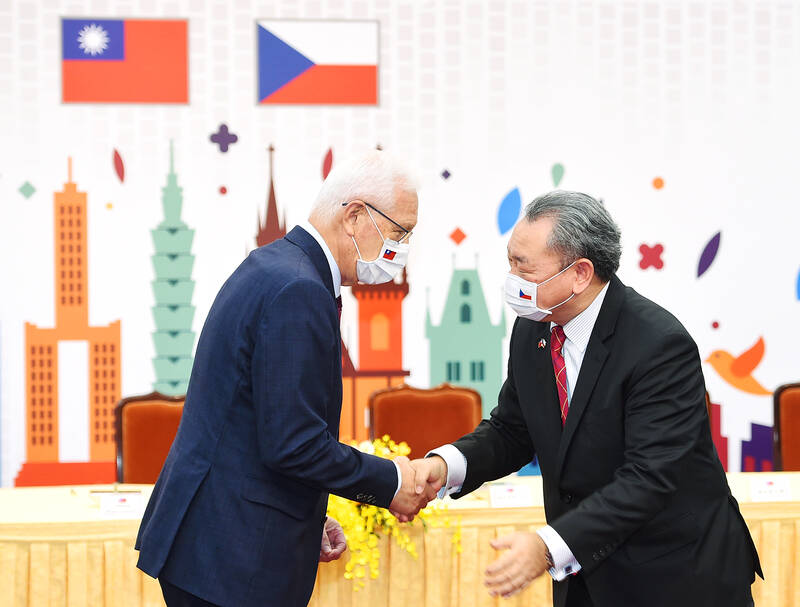Representatives from Taiwan and the Czech Republic have signed six memorandums of understanding (MOU) and cooperation agreements that are to serve as the basis for bilateral cooperation on technology, education and culture.
Five of the pacts were inked yesterday at a signing ceremony witnessed by a visiting Czech delegation led by Czech Senator Jiri Drahos and Vice Minister of Foreign Affairs Alexander Yui (俞大㵢).
They included one MOU each on semiconductor and education cooperation, signed by Representative to the Czech Republic Ke Liang-ruey (柯良叡) and Czech Representative to Taiwan David Steinke.

Photo: Liu Hsin-te, Taipei Times
The National Palace Museum and National Taiwan Museum on Thursday signed separate cooperation agreements with the National Museum in Prague, while National Chengchi University and National Sun Yat-sen University separately signed MOUs with Charles University in Prague.
Yui described the series of agreements as “a milestone” in the relationship between Taiwan and the Czech Republic.
The agreements would “help consolidate the resilience of democratic supply chains in the face of authoritarian threats” and “take Taiwan-Czech Republic relations to new heights,” Yui said.
Drahos, who arrived in Taiwan on Sunday for a six-day visit, said the six MOUs were the result of intensive meetings between his delegation and the representatives of different Taiwanese institutions over the past few days.
These “very important dealings” will contribute to more intensive exchanges between the Czech Republic and Taiwan, he said.
Drahos is chairman of the Czech Senate Committee on Education, Science, Culture, Human Rights and Petitions.
The Czech delegation, which departed yesterday, included Czech Deputy Minister for Education, Youth and Sports Radka Wildova, along with Czech Deputy Minister for Science, Research and Innovation Jana Havlikova.

ACTION PLAN: Taiwan would expand procurement from the US and encourage more companies to invest in the US to deepen bilateral cooperation, Lai said The government would not impose reciprocal tariffs in retaliation against US levies, President William Lai (賴清德) said yesterday, as he announced five strategies to address the issue, including pledging to increase Taiwanese companies’ investments in the US. Lai has in the past few days met with administrative and national security officials, as well as representatives from various industries, to explore countermeasures after US President Donald Trump on Wednesday last week announced a 32 percent duty on Taiwanese imports. In a video released yesterday evening, Lai said that Taiwan would not retaliate against the US with higher tariffs and Taiwanese companies’ commitments to

‘SPECIAL CHANNEL’: Taipei’s most important tasks are to stabilize industries affected by Trump’s trade tariffs and keep negotiations with Washington open, a source said National Security Council Secretary-General Joseph Wu (吳釗燮) arrived in the US for talks with US President Donald Trump’s administration, a source familiar with the matter said on Friday. Wu was leading a delegation for a meeting known as the “special channel,” the Financial Times reported earlier. It marked Trump’s first use of the channel since returning to the White House on Jan. 20. Citing a source familiar with the matter, the Financial Times reported that Minister of Foreign Affairs Lin Chia-lung (林佳龍) was also a part of the delegation. The visit came days after China concluded war games around Taiwan and amid Trump’s

Intelligence agents have recorded 510,000 instances of “controversial information” being spread online by the Chinese Communist Party (CCP) so far this year, the National Security Bureau (NSB) said in a report yesterday, as it warned of artificial intelligence (AI) being employed to generate destabilizing misinformation. The bureau submitted a written report to the Legislative Yuan in preparation for National Security Bureau Director-General Tsai Ming-yen’s (蔡明彥) appearance before the Foreign Affairs and National Defense Committee today. The CCP has been using cognitive warfare to divide Taiwanese society by commenting on controversial issues such as Taiwan Semiconductor Manufacturing Co’s (TSMC, 台積電) investments in the

HELPING HAND: The steering committee of the National Stabilization Fund is expected to hold a meeting to discuss how and when to utilize the fund to help buffer the sell-off The TAIEX plunged 2,065.87 points, or 9.7 percent, to close at 19,232.35 yesterday, the highest single-day percentage loss on record, as investors braced for US President Donald Trump’s tariffs after an extended holiday weekend. Amid the pessimistic atmosphere, 945 listed companies led by large-cap stocks — including Taiwan Semiconductor Manufacturing Co (TSMC, 台積電), Hon Hai Precision Industry Co (鴻海精密) and Largan Precision Co (大立光) — fell by the daily maximum of 10 percent at the close, Taiwan Stock Exchange data showed. The number of listed companies ending limit-down set a new record, the exchange said. The TAIEX plunged by daily maxiumu in just